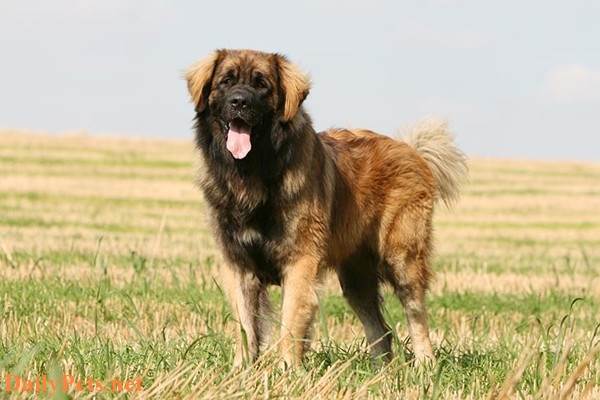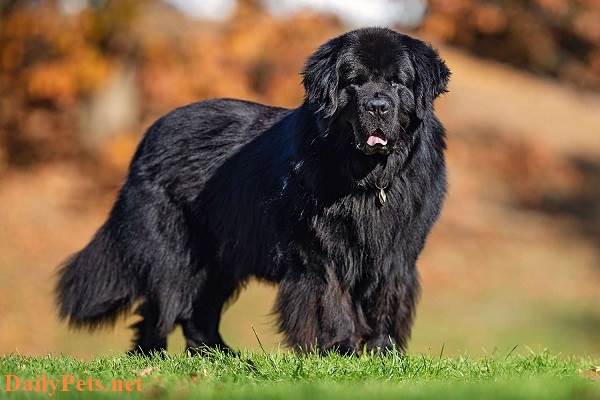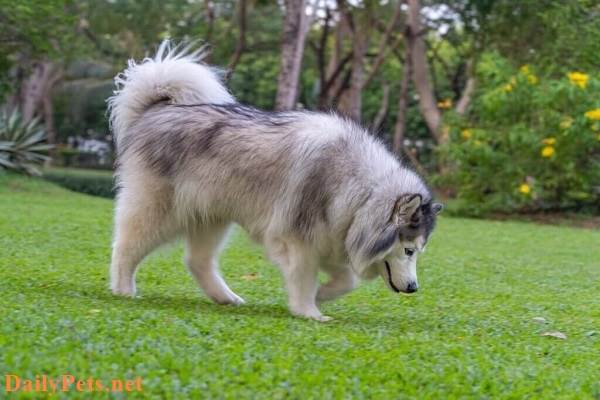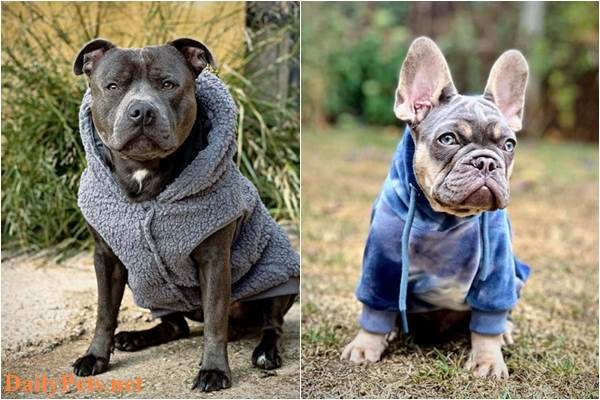Let’s explore this breed with the help of the pet news website – DailyPets.net!
Origin of the Leonberger Dog
The Leonberger dog is named after Leonberg, Germany, and was initially bred in Germany. This giant breed of dog was specifically bred to be a perfect companion, making it stand out from other large dog breeds, most of which were primarily designed for work.

Leonberger Dog.
The Leonberger breed was originally developed by a 19th-century politician and businessman named Heinrich Essig. His goal was to create the perfect canine companion for European royalty. By crossbreeding Saint Bernards and Newfoundlands, along with a few other large dog breeds, the German Leonberger breed was created, achieving Essig’s objectives.
Leonbergers became highly sought after by royalty, including Napoleon III, Tsar Alexander II, and King Edward VII. These royalty not only had them as pets but also adorned them with the finest dog accessories, giving them a royal touch. True to their ancestors’ working roles, Leonbergers were excellent farm dogs, using their strength and guarding instincts to protect herds, pull carts, and safeguard property. According to the American Kennel Club (AKC), Leonbergers are also exceptional swimmers, which might be surprising given their enormous size and thick, lush fur. Now, let’s delve into why Leonbergers are known as gentle giants.
The Development History of the Leonberger Breed
Leonbergers were bred in Germany in the mid-19th century, a period that coincided with the “dog lover’s craze” during the reign of Queen Victoria. These dogs were successfully marketed by their German creator, Heinrich Essig, from Leonberg, and they quickly gained favor among celebrities and the wealthy of that era. Although Essig did not keep detailed breeding records, he claimed to have used long-haired Saint Bernards, black and white Newfoundlands (Landseer), and a white Pyrenean mountain dog in the breed’s establishment. Local farms and meat dogs may have also contributed to this mix.
However, at present, Leonbergers are extremely popular. A couple of them went on a U.S. tour, performing in theaters, and Leonbergers were featured at the Westminster Kennel Club show.
After Essig died in 1889, his son continued to raise these dogs and produced the brown and “black-masked” Leonbergers as they appear today. The first Leonberger clubs were established in 1891. Less than two decades later, this breed was nearly extinct due to the devastation of World War I. Breeders worked to bring the Leonberger back from the brink, and it survived through World War II. The Leonberger became a member of the American Kennel Club in 2011 and currently ranks 33rd in AKC registrations.
Physical Characteristics of the Leonberger Dog
A suitable nickname for the Leonberger is “Leo,” and it’s like having a lion in the shape of a dog. With a magnificent coat and a gigantic size, this beautiful breed is a stunning performer with an exterior beauty that matches its inner charm. They are one of the cutest dog breeds available!
But being a gentle giant doesn’t mean they automatically make perfect companions for every dog lover. Leonbergers, though originally bred as companions as well as working dogs, require a lot of time and attention. While many enthusiasts love Leonbergers, they are best suited to a select few. Let’s explore where Leonbergers come from and what makes them so unique!
Leonbergers are large dogs weighing 110 to 175 pounds, with males standing about 25.6 to 31.5 inches tall and females slightly shorter. Their body length is greater than their height. Many Leonbergers have floppy ears and a mane that appears when they are two to three years old. Leonbergers usually mature by three years, although they reach their full size around one year.
The Leonberger’s coat is straight or wavy with a dense, woolly undercoat. The texture ranges from soft to coarse. Their color resembles that of a lion: yellow-gold to reddish-brown. They should have a dark mask or black on their face. Grooming tools for dogs will be useful for grooming this breed.
Personality Traits of the Leonberger Dog
Leonbergers are famous for being gentle giants, but they don’t automatically become that way. Before they mature, your Leonberger goes through a long “adolescent” period marked by typical behaviors of stubborn and sometimes unruly teenage years.
Like any dog, Leonbergers are clever chewers, and due to their size, they can cause more damage than dogs of other breeds. Do not give them free rein in your home until they mature. Keep your Leonberger puppy busy with training experiences and dog toys, play, and socialization. A bored Leonberger is a destructive Leonberger.
Begin training as soon as you bring your Leonberger puppy home while they are still manageable in size. Use positive reinforcement training techniques like praise, play, and food rewards while being patient. They will respond to kind, firm, and consistent training, but you will need to work with them daily until they are at least two years old to ensure their lessons stick. Avoid leaving food out. They are clever opportunists and can reach items 16 to 20 inches beyond their noses. You should also teach them from a young age to stay away from your belongings, as Leonbergers can quickly take possession of them, even chewing and destroying them if they desire.
Please note that this information is based on the provided text, and I cannot verify its accuracy or completeness. If you have specific questions or need more detailed information about Leonbergers, it’s advisable to consult a reliable source or expert in dog breeds.
Caring for a Leonberger Dog
Living Environment
Although Leonbergers can adapt to smaller family environments if their exercise needs are met, they are best suited to homes with larger yards and plenty of space to roam. If you live in an apartment or a smaller house, you may want to consider a different, smaller dog breed. It’s also important to remember that Leonbergers shed quite a bit and require daily grooming, which can be time-consuming. However, this breed makes an excellent family dog and is good with children and other pets.
They need early socialization and regular obedience training to ensure they can adapt and thrive throughout their lives. So, if you have the time, space, and patience for a large breed like the Leonberger, it can be a great fit for you!
Nutrition
As a large breed, Leonbergers do best with high-quality kibble containing animal protein as one of the top ingredients. Specifically, Leonberger food should be aimed at large breed dogs, as they require certain nutrients for proper bone development, especially when your Leonberger is a puppy.
For this reason, your “gentle giant” should eat food designed for their age, weight, and activity level. While treats are an essential tool for training, they are also calorie-packed, so experts recommend using them in moderation.
Grooming
Leonbergers are generally good with people, but that doesn’t mean this royal breed is easy to care for. Their beautiful, lush coat requires a lot of effort, and they shed quite a bit, especially during the shedding season!
Future Leonberger owners should be prepared to brush their dogs at least once a day, paying special attention to areas with longer or prone-to-matting hair. Be mindful that Leonbergers can be prone to matting, and brushing may be uncomfortable if their coat isn’t maintained daily.
With Leo’s giant size, even a simple brushing session can take a considerable amount of time, so prospective Leonberger owners should ensure they have plenty of free time before getting this large breed.
In addition to high-quality dog grooming products, regular bathing with quality dog shampoo, metal combs for dogs, and slicker brushes for the long, lush outer coat are recommended.
Moreover, like all dogs, your Leonberger will need regular nail trimming to prevent splitting and cracking, and their ears should be checked and cleaned regularly to avoid ear infections. Dog ear and eye care products can be helpful in this regard.
Exercise
While Leonbergers have relatively mild temperaments, they need plenty of exercise to stay healthy and happy.
The best exercise for Leonbergers includes long walks or runs with their human companions. They are known to enjoy running alongside a bicycle!
Although we don’t recommend allowing your Leo to run freely in public areas, they will enjoy having ample space to run and play in a large, fenced backyard.
Training
But how about training a Leonberger? Well, due to their large size and strength, early training methods are essential.
While many Leos may outgrow their owners in terms of physical stature, they are incredibly obedient and eager to please the humans they love. With proper socialization and obedience training, these dogs are excellent listeners and quick learners. Leo makes an excellent therapy dog thanks to its intelligence, gentle nature, and affection for children, adding to its endearing qualities.
However, as mentioned earlier, early socialization is a must for this breed. Early socialization not only ensures your Leonberger grows up well-rounded and adaptable to different people and environments, but it also helps reduce any anxiety that may arise from unfamiliar situations.
Health Status of the Leonberger
Leonbergers are very large dogs, and unfortunately, that means they have a relatively short lifespan. With an average life expectancy of around 7 years, this breed is also prone to various genetic health conditions, including issues related to conformation, hip dysplasia, elbow dysplasia, bone marrow inflammation, whole-body inflammation, cystinuria, eye conditions, and bloat.
To ensure your Leo starts on the right foot, you can choose to have early health checks done. While most reputable breeders can provide health certificates for their dogs, you can also perform some health checks yourself.
Early health checks can help you prevent or even avoid some genetic health issues that Leonbergers are prone to. In addition, products like joint and hip supplements for dogs, digestive health supplements for dogs, and various health care products should be readily available in your family’s medicine cabinet.
Please note that this information is based on the provided text, and I cannot verify its accuracy or completeness. If you have specific questions or need more detailed information about caring for Leonbergers, it’s advisable to consult a reliable source or expert in dog care.
Leonberger Dog Prices
The prices for Leonberger dogs can vary based on several factors, such as the dog’s pedigree, lineage, and breeding quality. As of the information provided:
- Non-registered Leonbergers: These dogs typically cost around $2,000.
- Registered Leonbergers of good lineage: Imported Leonbergers with a proper pedigree and origin can be priced around $3,000.
In addition to the initial purchase price, you should also budget for the monthly expenses related to your Leonberger, such as food, vitamins, and medications.
It’s important to note that the price may be higher if the parents of your Leonberger are of high quality. Acquiring a Leonberger from a reputable breeder allows you to ask questions about the temperament and health issues in previous litters or the dog’s parents. Many experts recommend meeting the dog’s parents if possible, as it can give you an idea of how large and what the appearance of your Leonberger might be.
Reputable breeders will be able to provide certificates proving that their litters have been checked for genetic health issues that are common in the breed. This can give you confidence that your puppy is healthy.
Please keep in mind that prices can vary, and it’s essential to do thorough research and choose a responsible breeder who prioritizes the health and well-being of their dogs. Additionally, adopting a Leonberger from a rescue organization is another option to consider, which may come at a lower cost and provide a home for a dog in need.





